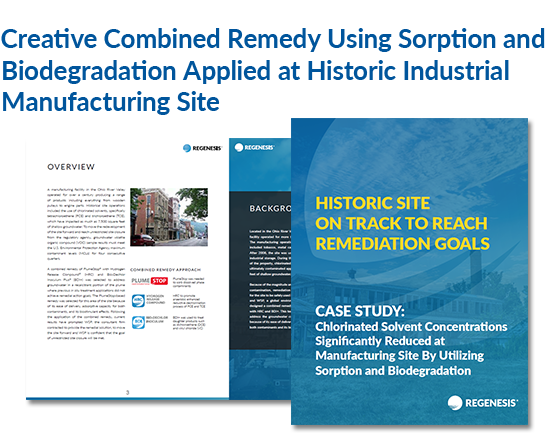This case study reviews a site in the Ohio River Valley where historic industrial operations over the last 100 years at a manufacturing facility have resulted in PCE and TCE impacts to 7,500 square feet of shallow groundwater. To move the redevelopment of this site forward, groundwater VOC sample results must meet the U.S. Environmental Protection Agency maximum contaminant levels (MCLs) for four consecutive quarters. Download the case study to learn about the combined remedy using PlumeStop, HRC, and BDI+ to address the contaminants.
Case study highlights:
- Creative combined remedy approach addressed accumulated contaminants from over 100 years of manufacturing operations
- Innovative application approach using 1.5” diameter wells effectively accommodated low ceiling and tight spaces, allowing for successful reagent injection
- 180 days post-injection, all VOCs were measured at greatly reduced concentrations and geochemical conditions remain ideal for biodegradation
About the Environmental Consultant:
 WSP
WSP is one of the world’s leading engineering professional services consulting firms. They are dedicated to their local communities and propelled by international brainpower. Their reputation is built on helping clients worldwide mitigate risk, manage and reduce impacts, and maximize opportunities related to health and safety, sustainability, climate change, energy, water and the environment. They engineer projects that will help societies grow for lifetimes to come. Their 5,000 multidisciplinary environmental experts are part of their 36,000 talented people in more than 500 offices across 40 countries. Visit www.wsp.com for more information.
WSP
WSP is one of the world’s leading engineering professional services consulting firms. They are dedicated to their local communities and propelled by international brainpower. Their reputation is built on helping clients worldwide mitigate risk, manage and reduce impacts, and maximize opportunities related to health and safety, sustainability, climate change, energy, water and the environment. They engineer projects that will help societies grow for lifetimes to come. Their 5,000 multidisciplinary environmental experts are part of their 36,000 talented people in more than 500 offices across 40 countries. Visit www.wsp.com for more information.


